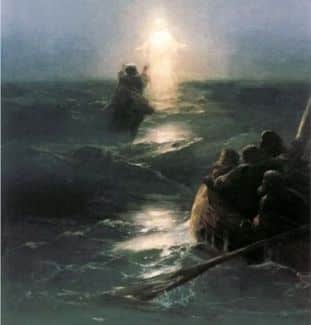
We humans are “seekers.” There is a restlessness inside of each one us that prompts us to venture out into the world and seek fulfillment. Young people seek friends, new forms of entertainment, popularity. Later we seek a meaningful job, a state in life, hobbies. Even we elders keep seeking—a purpose in life, companionship, solutions to our health problems.
When we find something or someone along the way that seems to satisfy us, we have a tendency to make a god of it—to hang on to it tightly and to try to get more of “it.” Sometimes our seeking gets us in trouble.
Israel had it made. They were the chosen ones of God, provided for in every respect. Yet they were lured into seeking the pleasures that their pagan neighbors seemed to enjoy. They left their God and pursued a “new and improved” variety. These gods led the Israelites into misery. Jeremiah writes about this (Jeremiah 30:1-2,12-15,18-22).
“Incurable is your wound, grievous your bruise; there is none to plead your cause, no remedy for your running sore, no healing for you. All your lovers have forgotten you, they do not seek you.”
There “lovers” led them into a dark place and left them there. They didn’t “seek them” because they didn’t really care.
What Israel eventually found out is that their God did seek them. He was a “seeker,” unlike the pagan deities that pleasured them for a moment and then dropped them. Their God was faithful; he would never abandon them and would never stop seeking them even when they were lost and alone.
In today’s gospel story (Matthew 14:22-36), we read that the disciples of Jesus were in trouble.
“Jesus made the disciples get into a boat and precede him to the other side of the sea…he went up on the mountain by himself to pray…Meantime the boat, already a few miles from shore, was being tossed about by the waves, for the wind was against it. During the fourth watch of the night, (Jesus) came toward them walking on the sea.”
The disciples were too far away from shore to turn back, they couldn’t move forward because the wind was against them, and their boat was being tossed by the storm. They were powerless and had nowhere to turn. They couldn’t call on Jesus because he was several miles away. It was at that point that Jesus began to seek them. When they were powerless over the forces of nature, he suddenly showed up to help them.
It was this moment when the impetuous Peter wanted to walk on water to meet Jesus. We know what happened. He walked a few steps, then became frightened and began to sink.
“He cried out, ‘Lord save me!’ Jesus stretched out his hand and caught him…”
Even when Peter tried to reach Jesus, he failed. Jesus, however, didn’t fail him. He stretched out his hand, caught him, and pulled him, miraculously, from the raging sea. Peter cried out the prayer that we all need to learn: “Lord, save me!”
Let us practice Peter’s prayer daily. There is always an “edge” in our lives, where we are powerless. Maybe our “gods” have let us down. Maybe we’ve been too daring. Maybe we feel that we are sinking in the sea of indecision and trouble. We always need a savior. The good news is that our Savior is already in the process of seeking us. He is whisking his way across the waters to find us. His hand is stretching out to catch us. The Good Shepherd is always seeking that “lost sheep” inside of us, to rescue it and take it into his arms. He waits for the moment when we realize how much we need him and cry out, “Jesus, save me!”
“The children of your servants shall abide, and their posterity shall continue in your presence” (Ps 102:29).
